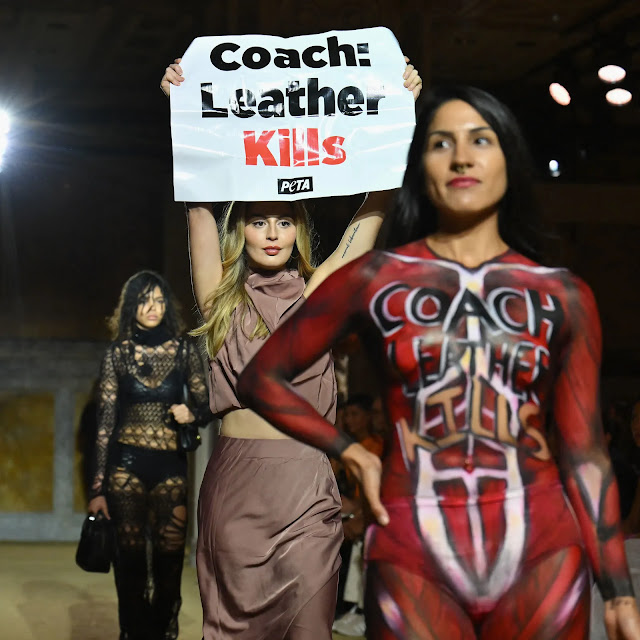Luxury brand Coach's spring/summer 2024 launch was almost ruined by animal rights protests
 |
A Peta protester holds a sign on the runway during Coach's Spring/Summer 2024 show at New York Fashion Week.
|
Libraries are usually quiet places where people go to study or relax, but on Thursday night American luxury brand Coach broke protocol by kicking off New York Fashion Week by showcasing its spring/summer 2024 collection at the New York Public Library, the second. the largest public library in the United States.
Instead of silent librarians and hard-backed chairs, there are soft velvet-covered benches and celebrities including actor Jennifer Lopez and rapper Lil Nas
However, it was the unexpected appearance of activists from the animal rights organization Peta that caused the biggest stir.
However, it was the unexpected appearance of activists from the animal rights organization Peta that caused the biggest stir.
Two protesters, one wearing a meat- painted bodysuit and the other holding a sign reading" Leather Kills" compactly joined the models on the catwalk before being led down by security. The move comes after Peta said in July that it intended to make the use of wool and leather as fur unacceptable.
Many see this as an unattainable goal. Leather goods are the cornerstone of the success of most luxury brands, and while faux leather is often touted as a vegan alternative, options like "leather" are derived from plastic and petroleum-based materials.
 |
| Edward Enninful, Jennifer Lopez and Anna Wintour at the Coach sprng/summer 2024 show at the New York Public Library. |
However, with brands looking to attract Gen Z – a consumer group that will represent 40% of the luxury goods market in 2035 and increasingly concerned about sustainable fashion – the breed has begun to find ways to solve this skin conundrum.
Speaking ahead of the show, Coach creative director Stuart Vevers described the catwalk as "a place to experiment with new concepts of sustainability".
In April it launched Coachtopia, a sub-brand of bags made from tip - bound leather. On Thursday it took effects a step further with a slew of pieces, including biker jackets and short, strappy dresses, made by reusing being leather, including dead stock and plant scraps. Other pieces are made from particulars bestowed by guests to the in- store recycling action.
In an age where secondary shopping has come a new kind of modesty, it's also a smart way to attract a client who wants to buy commodity new but does not inescapably want that piece to look new.
Vevers says this season means "moving down from introductory designs and quality accoutrements ." This includes bags, like its best- dealing Tabby bag, which Vevers imagines will" still be used in the coming 50 times." Starting at £ 250, it's a price considered a sweet spot for luxury.
 |
| A model on the catwalk at the Coach launch in New York. |
The collection marks the 10th anniversary of Vevers' tenure at Coach. Despite spending ten years as a Brit in the city, Vevers says he wants to maintain "an outside perspective". He is known for an abiding fascination with America, an interest first piqued by watching American films as a teenager in Doncaster.
Rather than a retrospective look, Vevers explores his personal memories of arriving in the city as a college graduate in the 1990s. Inspired by the girls he danced with at the Aggregate Club in the East Village, a mecca for artists, musicians and drag queens. A T-shirt emblazoned with "Donohue's Steak House" is a nod to his favorite restaurant, which first opened in the 1950s.
Coach is part of the Tapestry Group, which also owns Kate Spade and Stuart Weitzman, and last month announced the acquisition of Capri Holdings, owner of Versace, Michael Kors and Jimmy Choo.
The $8.5bn (£6.8bn) deal marks one of American fashion's biggest attempts to create a US-based luxury fashion conglomerate to rival European giants such as LVMH, home of Louis Vuitton and Dior and Kering, which owns Gucci and Santo Laurent among others.
Coach under Vevers' creative direction has come Tapestry's most successful brand. It makes up nearly three-quarters of Tapestry's revenue, and while in August Tapestry reported net sales of $6.66 billion in 2023, down slightly from $6.68 billion in 2022, Coach's sales grew by 5 percent. % in the fourth quarter.




.png)
0 Comments
If you have any doubts, Please me know